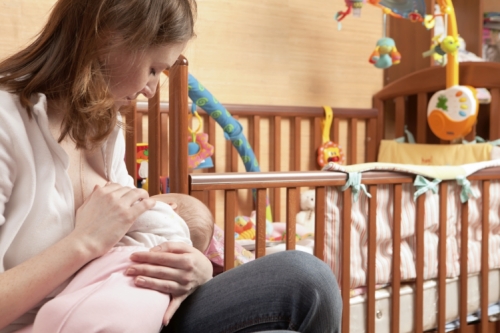When it comes to healthful habits for new mothers and babies, breastfeeding almost always tops the list. The benefits of breast milk have been discussed time and time again. With all the positive press, it’s easy to assume that breastfeeding can help prevent every problem a mother or baby could encounter.
“In public health circles, the statement is often made that breastfeeding prevents postpartum depression,” says Alison Stuebe, a researcher at the UNC School of Medicine. According to Stuebe, that assumption is based on one-time surveys that often find that mothers who are formula-feeding are more likely to be depressed than mothers who are breastfeeding. “But it doesn’t take into account the moms who may have been having trouble breastfeeding and then quit,” Stuebe says. “It may not be that breastfeeding prevents depression, but rather that depression prevents breastfeeding.”
In Stuebe’s clinical practice and in research studies, she says there is substantial overlap between problems with breastfeeding and postpartum depression, but the potential cause and effect remains unclear. Are new mothers depressed because they can’t breastfeed their babies? Or are they unable to breastfeed because they’re depressed?
Stuebe and her collaborators, Samantha Meltzer-Brody, Karen Grewen, and Cathi Propper, received a 2.9-million dollar grant from the NIH to learn more about the cause-and-effect relationship of breastfeeding and postpartum depression.
A key factor in the study is oxytocin, one of the hormones vital for breastfeeding. Prolactin is a hormone that stimulates the breast to make milk. This milk is stored in glands that are wrapped in smooth muscle cells inside the breast. Oxytocin makes those muscles contract so that milk can travel from the glands to the nipple, a process commonly referred to as “letdown.”
“If there’s no oxytocin, it’s as if the baby is sucking through a really tiny straw,” Stuebe says. “Even if he sucks really hard, he’s not going to get anything.” In their preliminary work, Stuebe and her colleagues found that mothers with symptoms of depression and/or anxiety had lower oxytocin levels during breastfeeding.
Lack of oxytocin may do more than hinder the mother’s ability to breastfeed—it may also cause problems with emotional interaction and bonding between mom and baby. “That’s the main thing we’re looking into with this study,” Stuebe says. “Does lack of oxytocin mess up the mother-baby relationship?”
To answer this question, Stuebe and her team will work with a variety of pregnant women—some may already have children and be expecting their second or third, and some will be first-time mothers. Some of the women will have a history of depression or anxiety, and some will not. The study will follow mothers from late pregnancy through the baby’s first birthday.
The team’s goal is to understand how maternal depression and anxiety impact the mother-baby relationship. “We hope to be able to use our findings to identify moms at high risk and target treatment to repair the mother-baby bond,” Stuebe says.


